A cut flower garden brings joy to the grower – that’s you! – as well as the recipient of the bouquets, by adding beauty not only to their home but to yours as well, both inside and out. To help you get started, here is a list of the best plants for a cut flower garden, as well as tips for growing them.

27 Best Plants for a Cut Flower Garden
When choosing plants for a cutting flower garden, start with multiple colors of a few types of plants, adding more varieties each year. Consider the shape and size of the flowers as well as color, mixing spikes, discs, globes, and others. And don’t forget to include foliage to fill out the bouquets.
The ideal flowers will have long stems and a long bloom time and, perhaps most importantly, will last several days in a vase. Speaking of bloom time, keep in mind that plants flower at different times, so don’t plan on pairing an early spring bloomer with a summer flower, and make sure to include multiple flowers for each season.
Multipurpose plants are great, such as herbs that work as bouquet fillers as well as kitchen ingredients, flowers that can be dried for fall arrangements, and foliage that doubles as winter wreath material.
Best annual flowers for a cut flower garden
Annuals are a great place to start for cutting flowers, as they can be tucked in just about anywhere you have space for them, including the vegetable garden. And if you decide you don’t like something, you can plant a different flower in its place the next year, or even later in the same growing season.
1. Sunflower
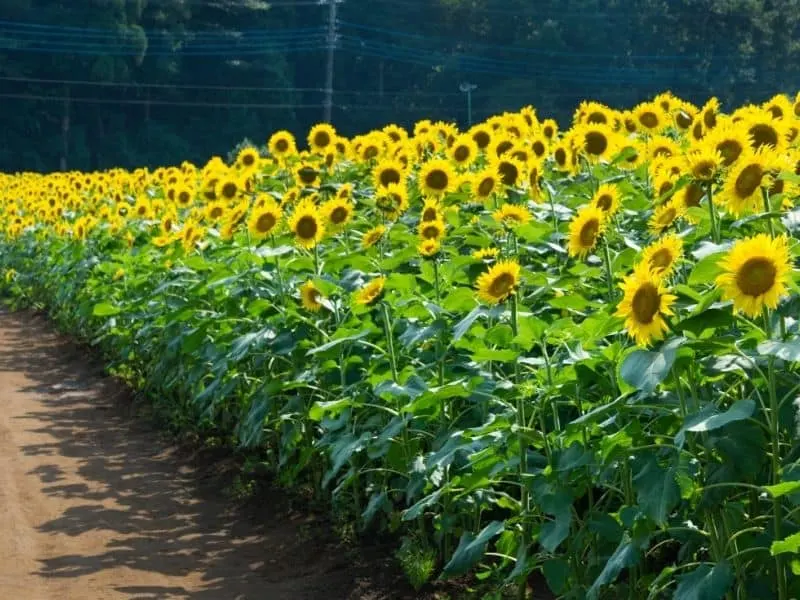
Sunflowers are available in a surprising variety of colors and sizes. Choose between the classic single stem sunflowers, which produce a single large bloom, and branching varieties, which produce more, smaller flowers over an extended season. Or, of course, plant some of each!
The single stemmed varieties may be planted as close as six inches apart for more flowers in less space, or give them up to a foot between each plant for larger blooms. Cut as soon as the petals begin to open.
2. Cosmos
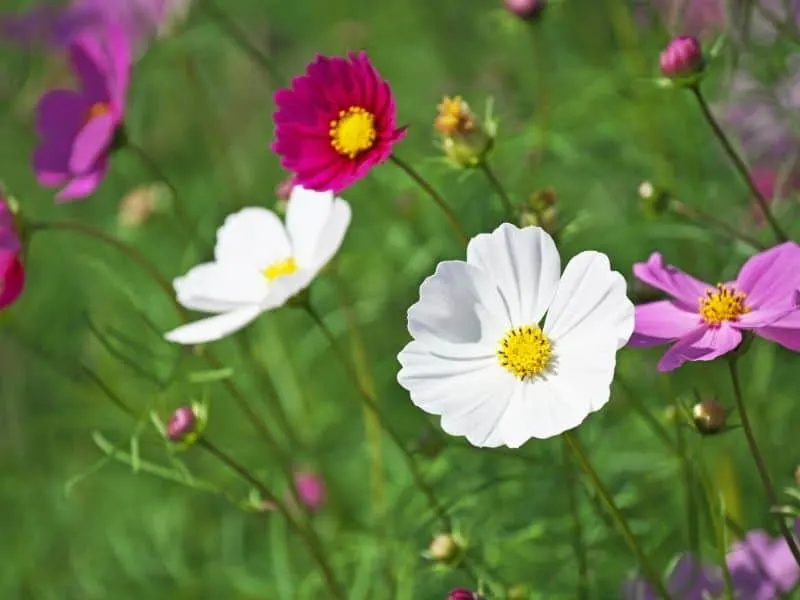
Both prolific and easy to grow, cosmos are a cutting garden favorite. Just a few plants will produce armloads of flowers, and they come in a range of warm colors.
To encourage branching, pinch the center stem when the plant reaches about a foot in height. Cut just as the blooms begin to open for the longest vase life, and harvest regularly for continual growth.
3. Zinnia
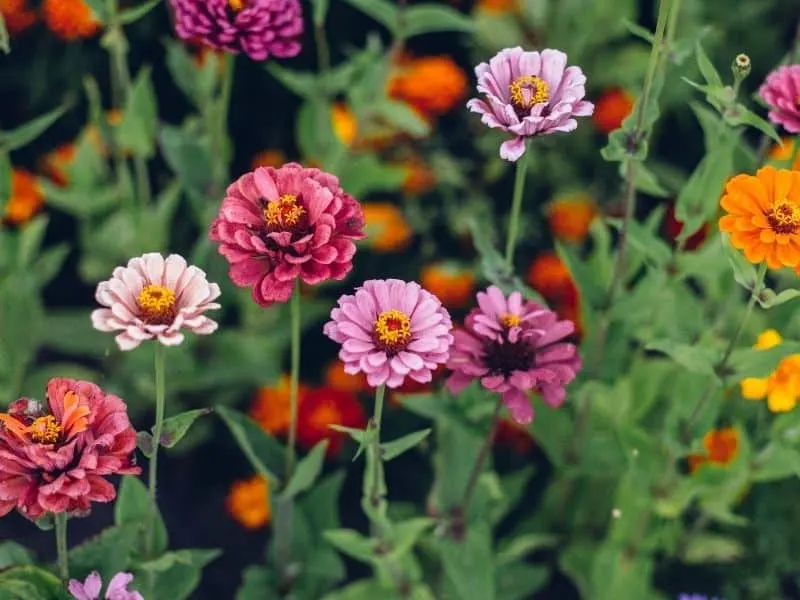
A cut flower garden is hardly complete without some zinnias. They are easy to grow from seed, have long stems, come in a wide variety of vibrant colors, and bloom all summer. Here are details about how to grow zinnias.
They also grow remarkably quickly, though, of course, you can start them inside for an even earlier harvest.
As with cosmos, cut the center stem when the plant reaches 10 to 12 inches tall to encourage branching and thus more flowers.
4. Snapdragon
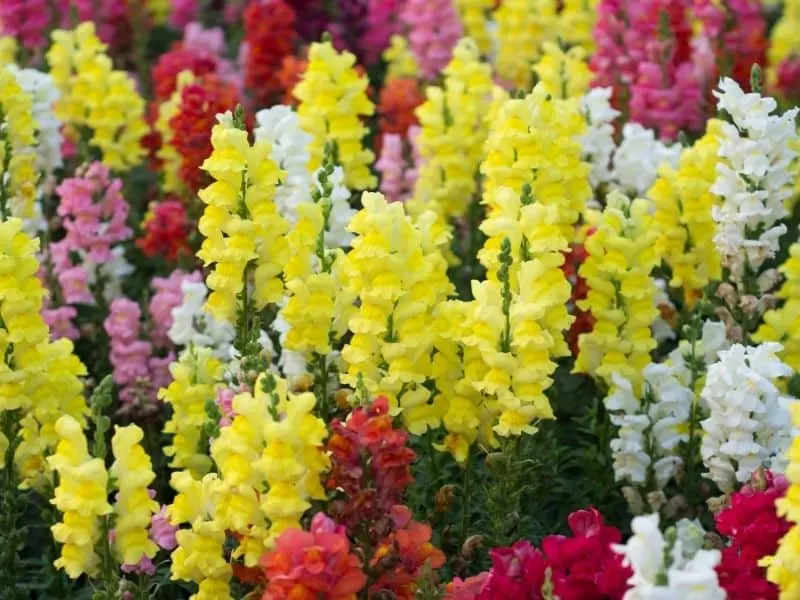
Reliable, generous bloomers, snapdragons go great with most other flowers. These spiked flowers come in many colors, and as an added benefit, they attract bees, butterflies, and even hummingbirds to the garden.
Pinch off the tops when seedlings reach three to four inches to encourage branching, and pick the flowers regularly to encourage new growth.
5. Bells of Ireland
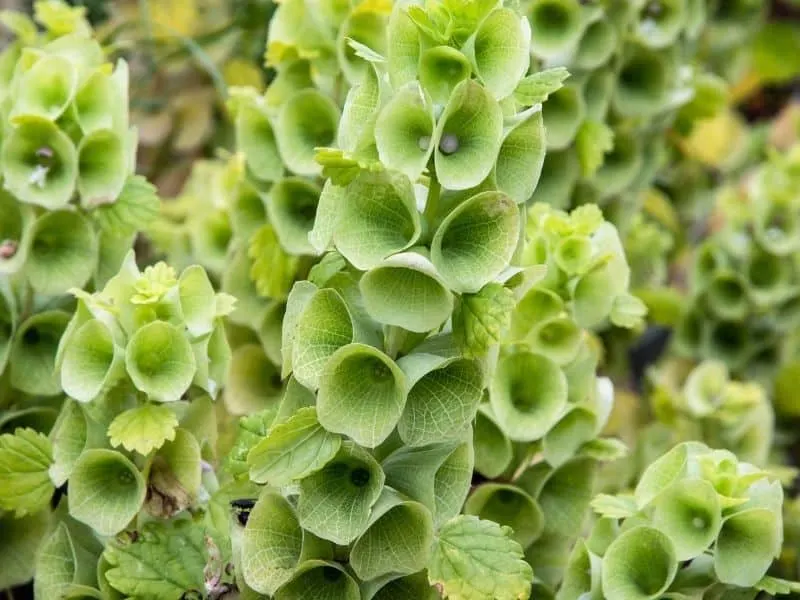
These unique spike flowers are known for their green, bell-shaped calyces surrounding tiny white flowers with a sweet vanilla scent. Especially popular around St. Patrick’s Day, they also add interest to arrangements throughout the summer. Depending on your local climate, they will self-sow, given the chance, and return every year.
6. Celosia
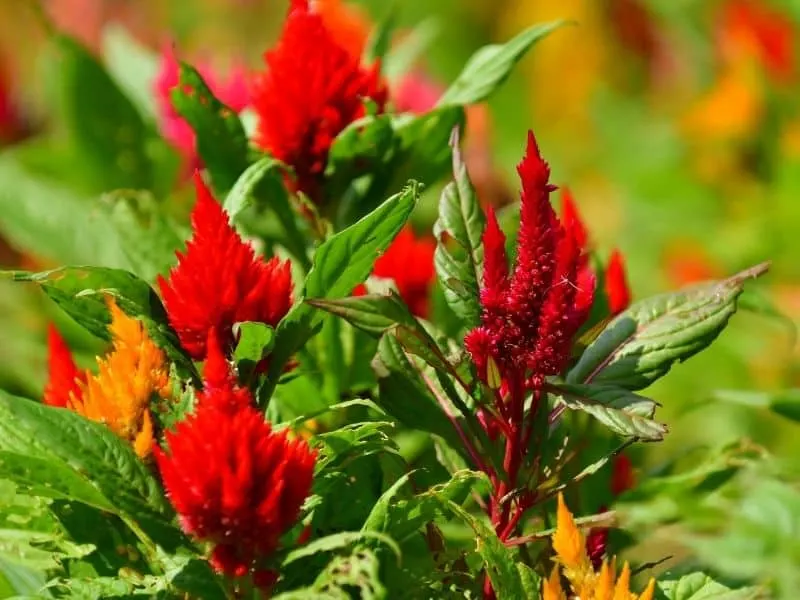
In addition to color, celosia adds interesting texture to bouquets with feathery plumes or velvety, folded flowers called cockscomb.
A slow grower, celosia should be transplanted rather than direct sown unless you live in an area with a long growing season. These top-heavy flowers will benefit from sturdy support to keep the stems growing straight.
7. Amaranth
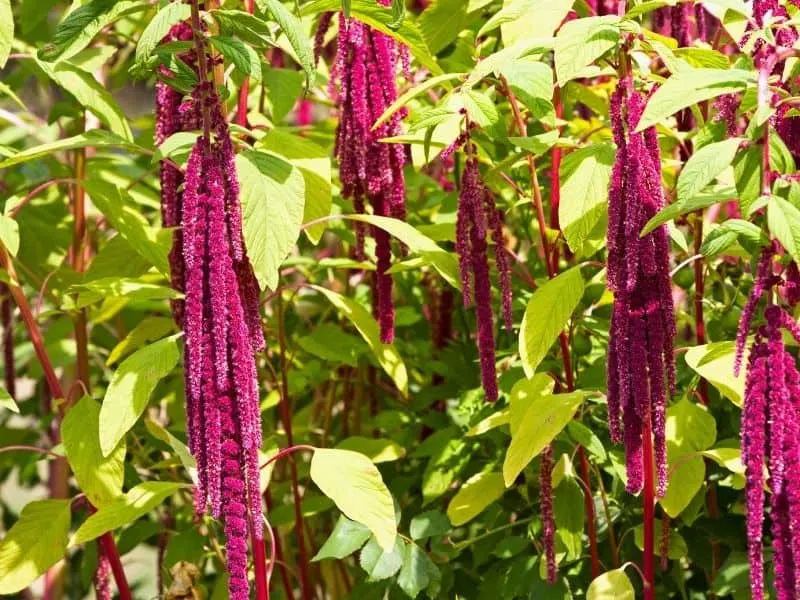
Like sunflowers, amaranth can grow pretty large. The burgundy or green flowers lend a lovely texture to arrangements and work especially well in late summer bouquets. Whether started indoors or direct seeded, amaranth is productive and easy to grow in a cut flower garden.
8. Sweet pea
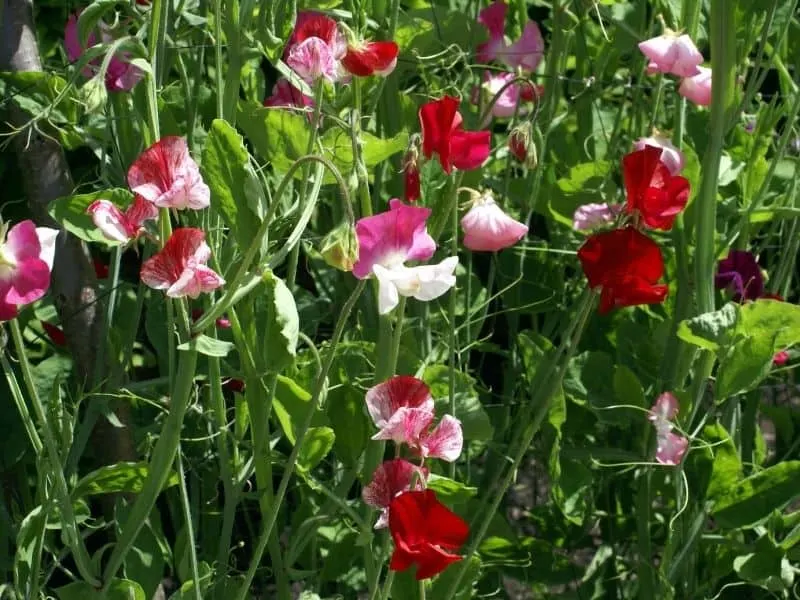
Sweet peas are a wonderful vining flower to add to a cutting garden. The delicate flowers, which come in many shades, will continue to bloom as long as you keep cutting them to prevent seeds from setting. Since some varieties will grow as high as six feet, make sure to provide them with proper support.
9. Marigold
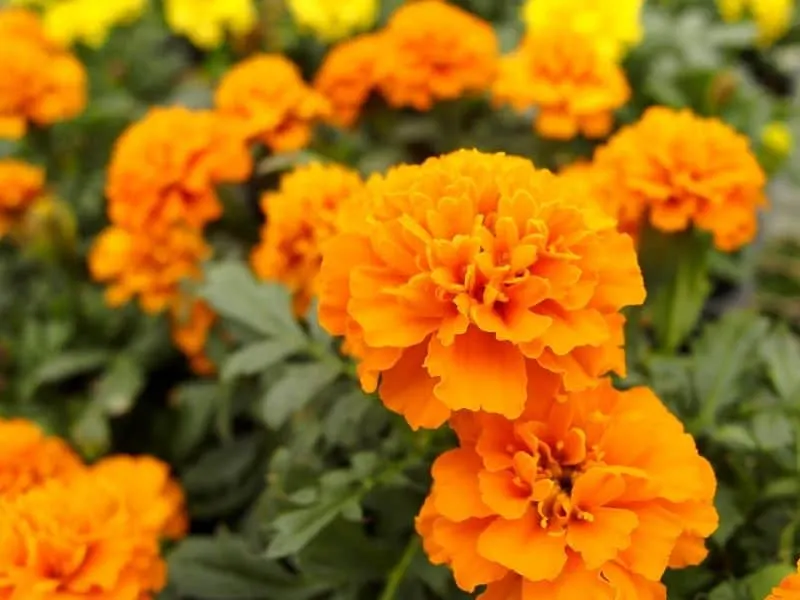
These bright yellow and orange flowers have the added benefit of deterring insect pests from the garden, so feel free to tuck them in among your vegetables. Add the flowers to late summer bouquets and use the foliage as filler. This is another plant that should be pinched when young to encourage branching.
10. Larkspur
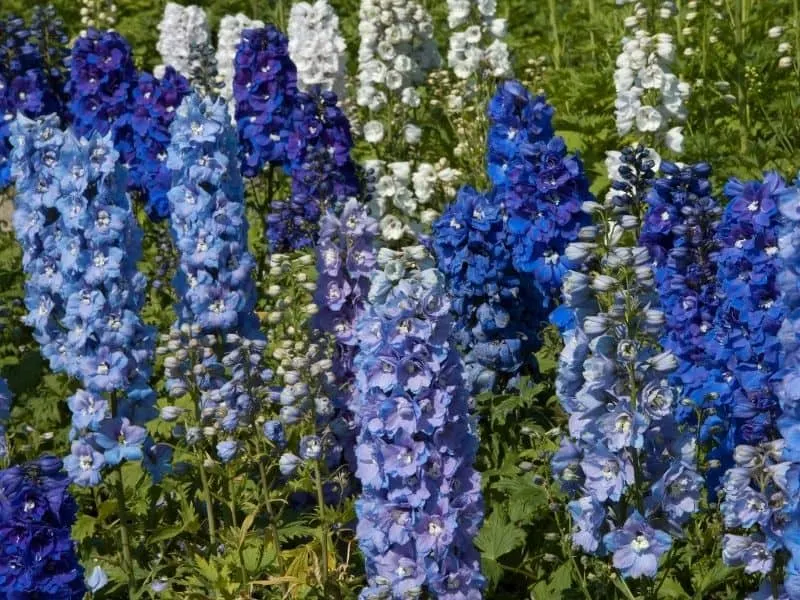
Larkspur produces tall, graceful stalks of airy flowers, often blue but also in white, pink, purple, or even red. The flowers will self-seed if given the chance, and regular picking will encourage continuous blooms. They have lovely, light, fern-like foliage and pair well with cosmos and snapdragons.
Best foliage and fillers for a cut flower garden
Although flowers are certainly the stars of any cut flower garden, plants grown for their foliage should not be forgotten. These often-overlooked “fillers” complement the flowers in an arrangement, adding greenery and texture. As an added bonus, several of these are edible herbs that can also be used in the kitchen!
11. Rosemary
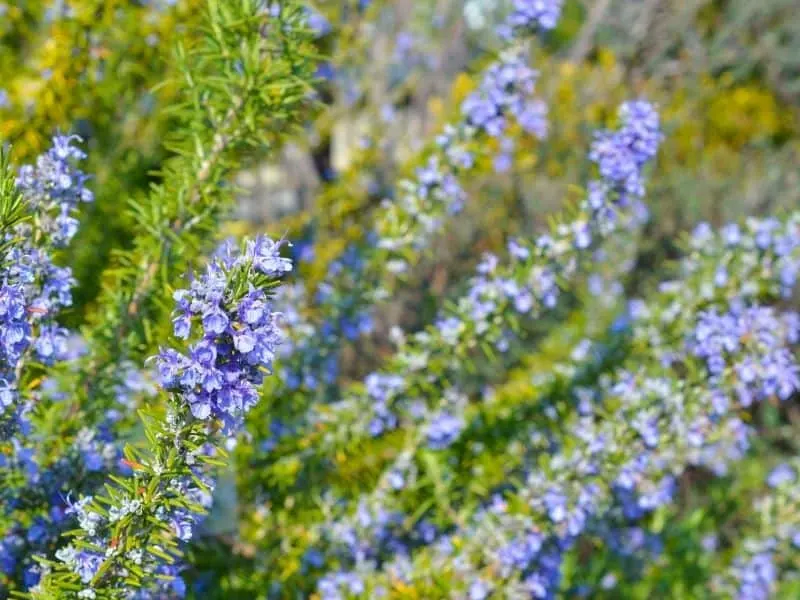
With a genus that translates to “mist of the sea” (Rosmarinus), it’s no surprise that this culinary herb is also popular among cut flower gardeners. This perennial has lovely gray-green, needle-like foliage with a piney fragrance.
12. Ninebark
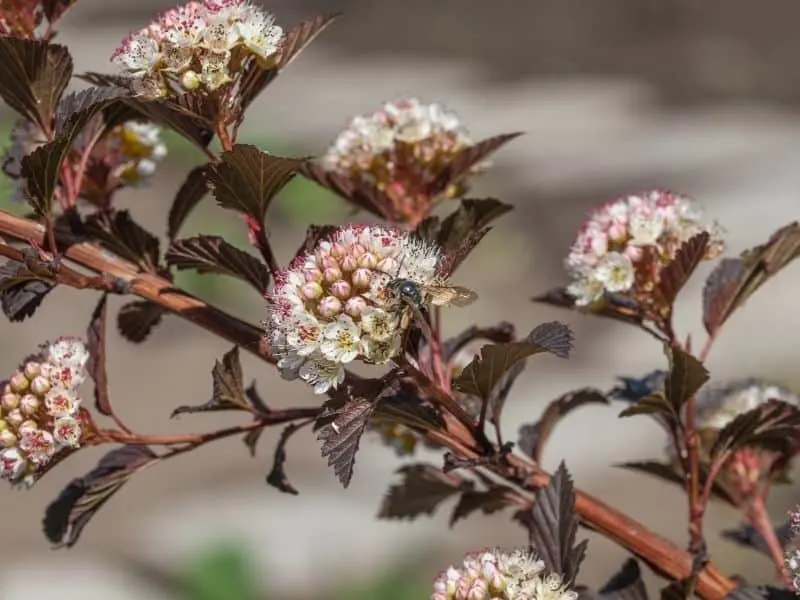
This native shrub contributes short-lived white or pink blossoms to spring bouquets, and the clusters of seed pods that follow add a level of textural interest. But the foliage is the real draw, with leaves ranging in color from green to almost black.
13. Basil
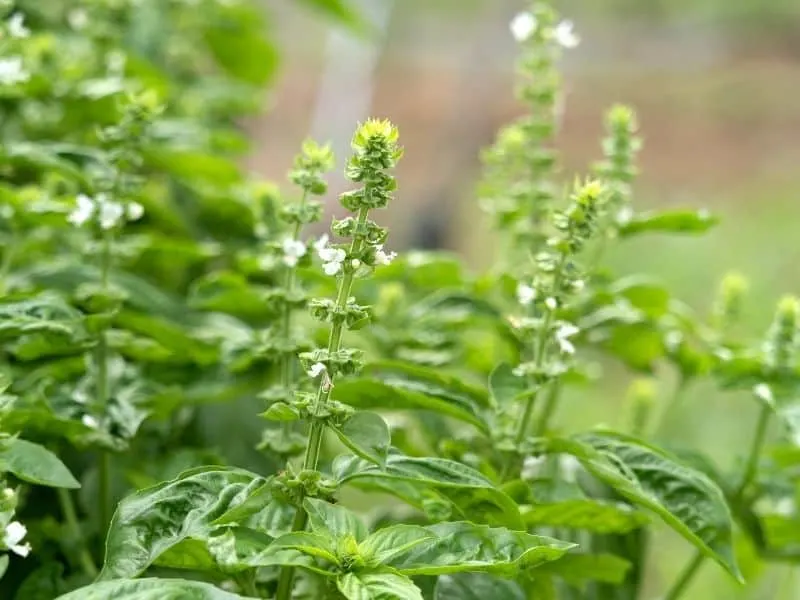
Basil can be grown for its spiked flowers as well as its foliage, both of which come in different shades. Cinnamon basil and purple-leafed varieties are especially popular. Since it’s susceptible to wilting, harvest basil in the morning or evening and let stems rest in water before using.
14. Russian sage
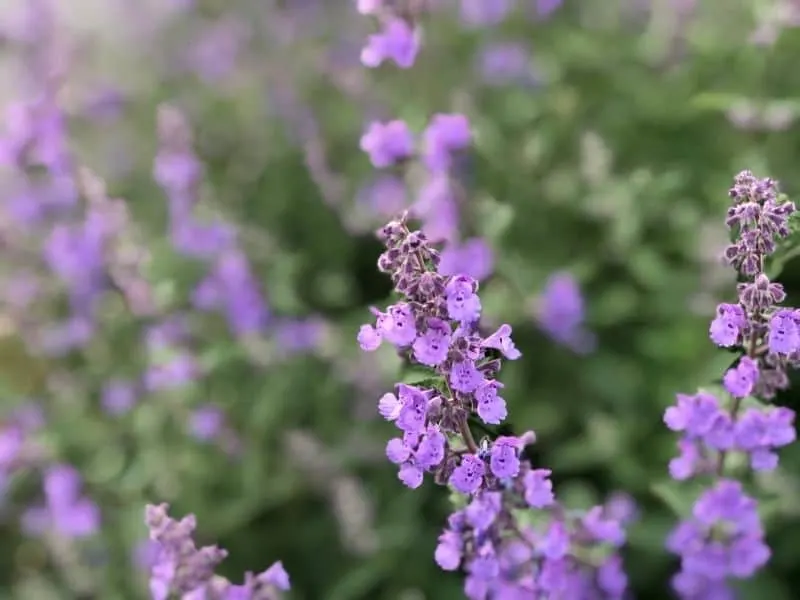
This large, shrubby perennial has feathery, silvery leaves and tall, airy spikes of lavender flowers that bloom in late summer and into fall. Unlike its culinary counterparts (which also make great fillers), Russian sage needs plenty of space, growing to three or four feet high.
15. Ammi
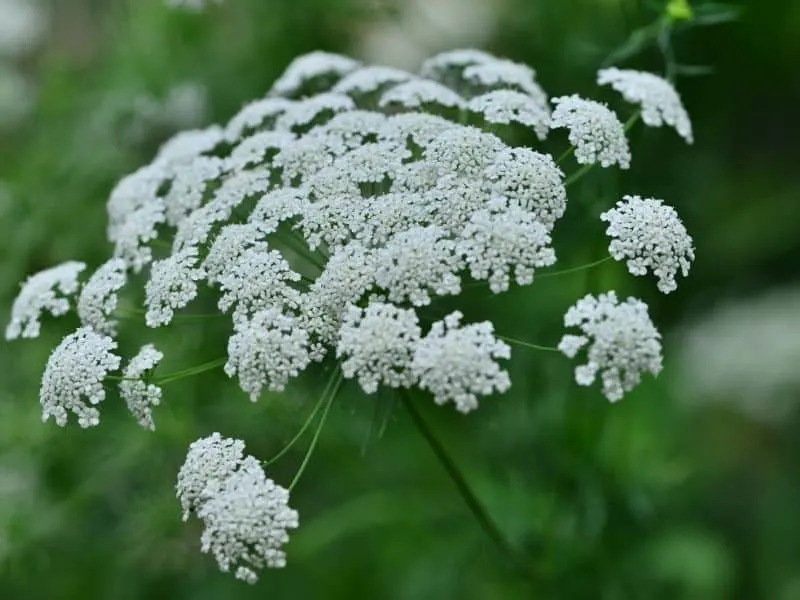
More commonly known as false Queen Anne’s lace, this cold tolerant wildflower has delicate, lacy blooms as well as feathery foliage. It also attracts beneficial insects to the garden.
16. Feverfew
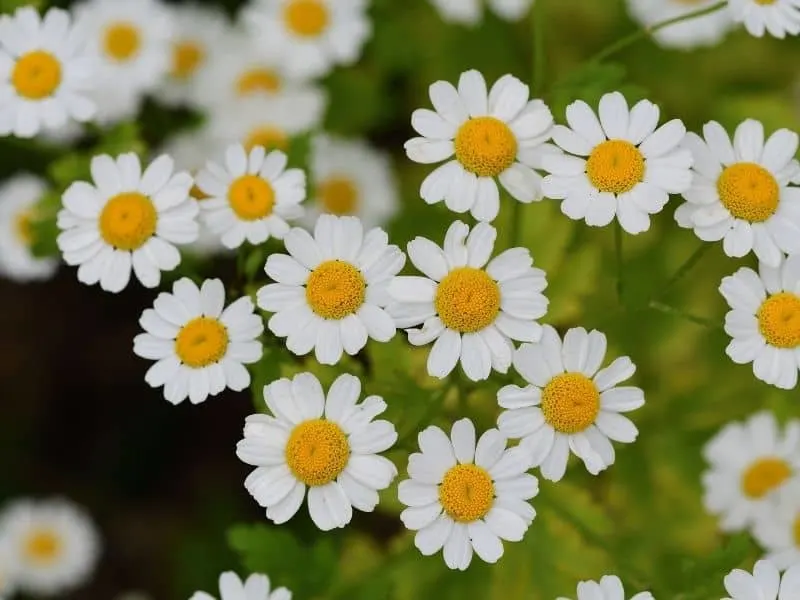
A bushy, short-lived perennial, feverfew is often grown as an annual. It has fragrant, ferny foliage and daisy-like flowers that are typically white but sometimes yellow. Some varieties have double or even pom-pom flowers.
17. Hosta
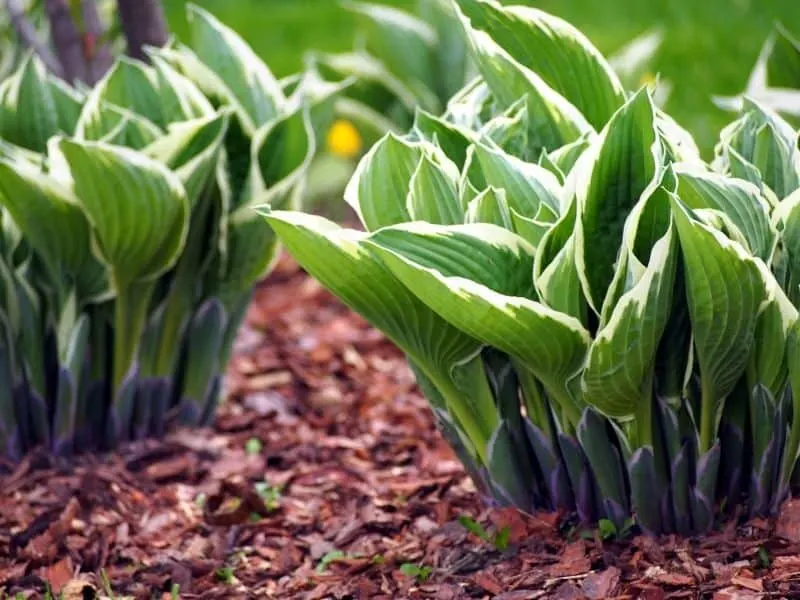
The characteristic deeply veined, heart-shaped leaves of these popular shade garden perennials provide a beautiful background to cut flower arrangements. Both the solid and variegated types work well.
18. Mint
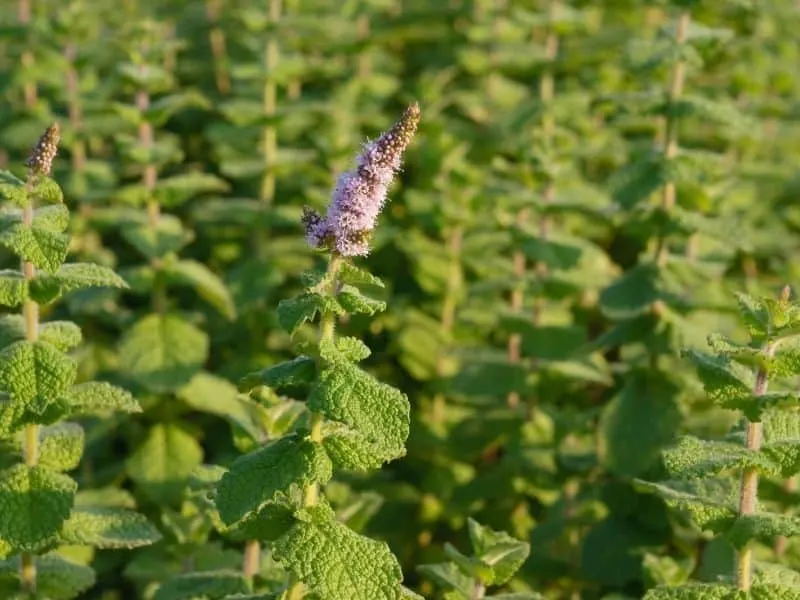
Mint isn’t just for tea! This vigorous spreader is one of the earlier plants to emerge, making it perfect for spring bouquets. In addition to the standard green varieties are chocolate mint, with its dark brown stems, and pineapple mint, with creamy variegated leaves.
19. Dill
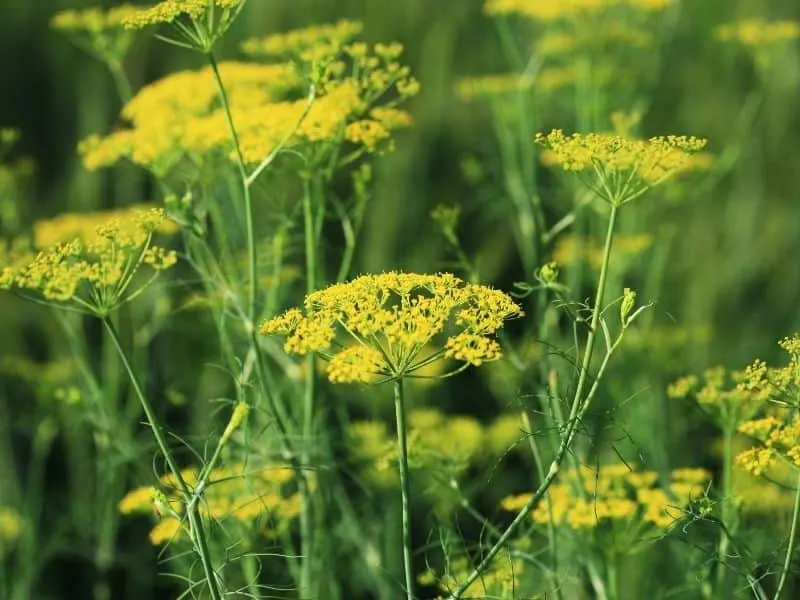
Similar to Queen Anne’s lace, this herb has ferny foliage and airy umbrellas of delicate yellow flowers. Dill is especially beautiful when it has just set seeds.
Perennial cut flower garden
Although annuals may seem like the obvious choice for a cut flower garden, many perennials produce excellent cut flowers as well. Plus, they don’t need to be planted every year and therefore can serve as permanent fixtures in your landscaping.
20. Shasta daisy
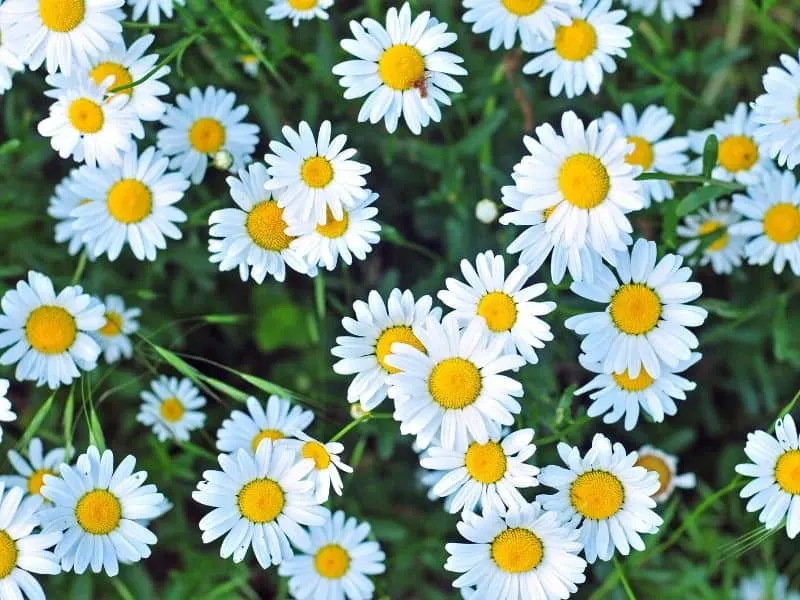
These cheerful flowers bloom from spring through early fall. Because they are aggressive, non-native spreaders, make sure to pick all the flowers before they go to seed to prevent them from taking over.
21. Yarrow
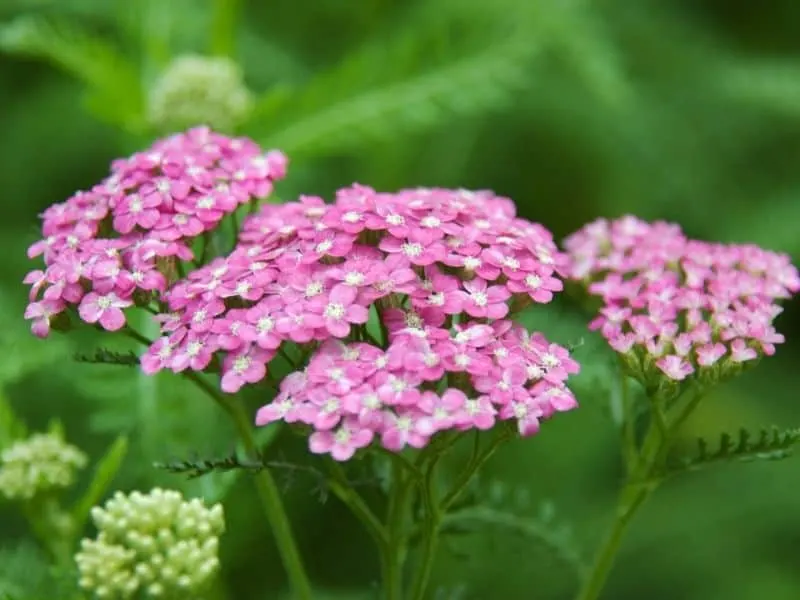
Known for its feathery foliage and flat-headed flowers, yarrow is available in yellow, pink, white, and red. This low-maintenance flower works equally well in fresh and dried arrangements.
22. Lupine
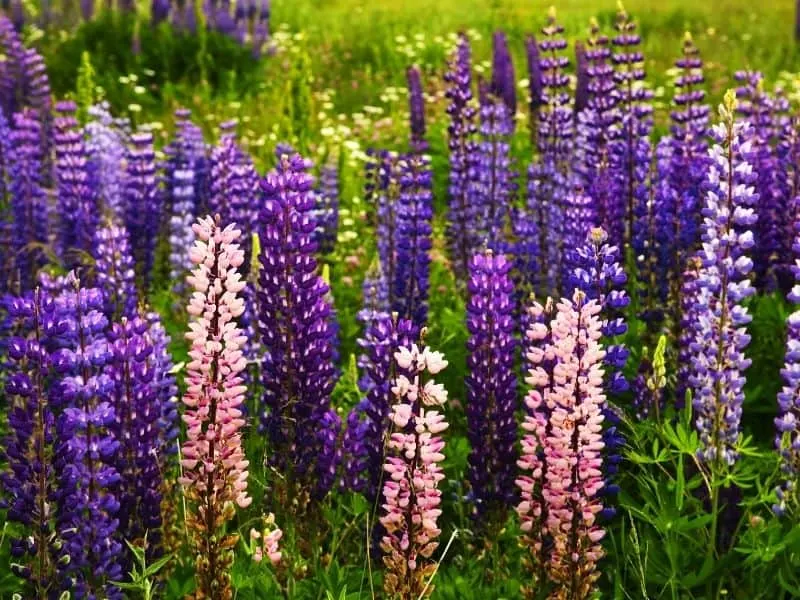
These tall, spiked flowers come in a variety of colors. While most of the popular garden varieties are hybrids, they derive from native North American wildflowers.
23. Dahlia
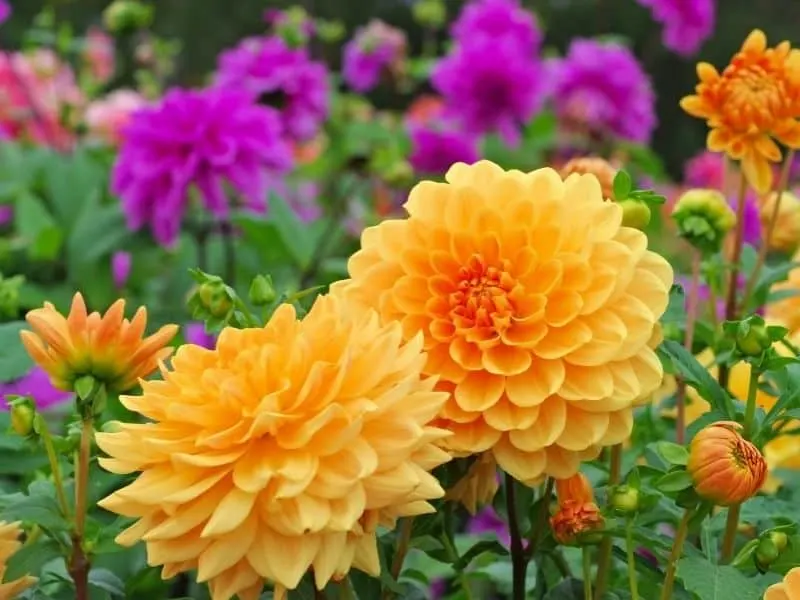
Although one of the more difficult flowers to grow, dahlias are a popular choice for cut flower gardens. These vibrant flowers come in a wide variety of colors, shapes, and sizes.
24. Foxglove
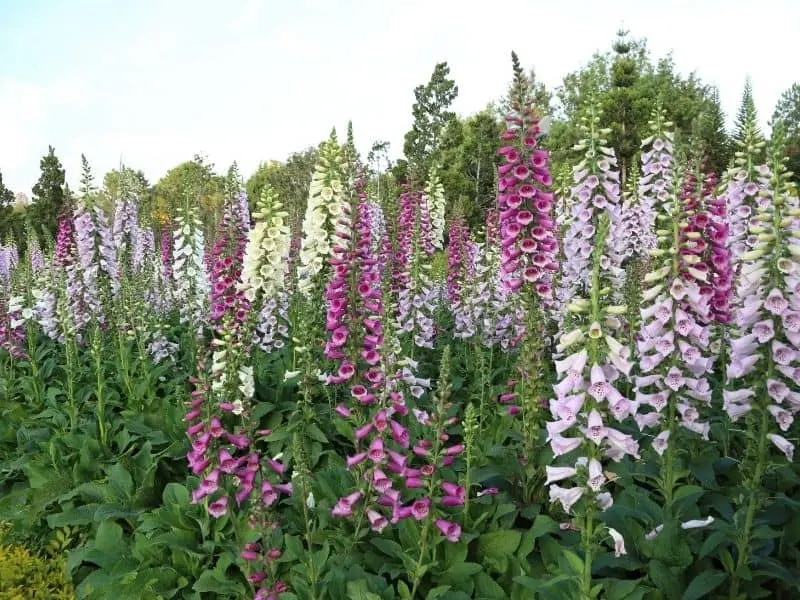
Also known by their genus, Digitalis, foxgloves produce tall spikes of tubular florets in white, yellow, pink, purple, and red. Although most foxgloves are technically biennials, a few perennial species do exist.
25. Peony
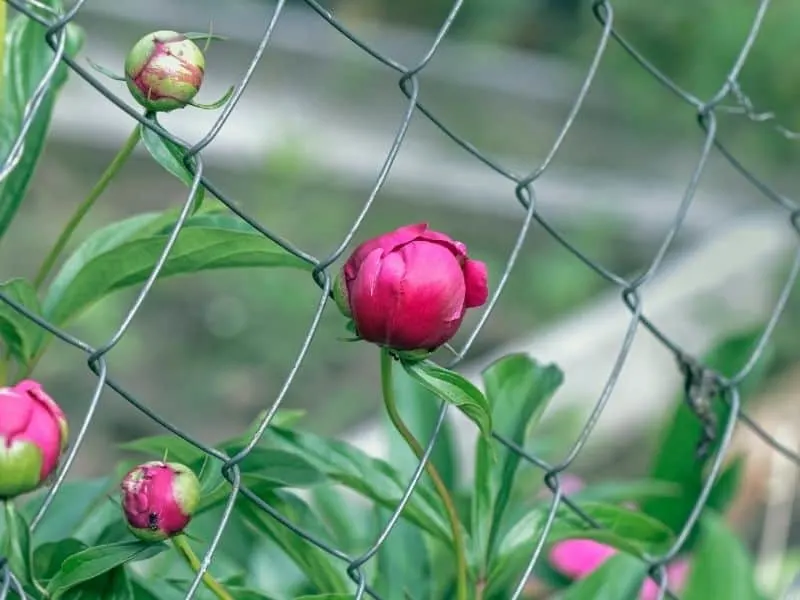
These large, often fragrant flowers are typically found in white and pink shades and bloom from late spring through early summer. They tolerate neglect fairly well, making them easy to care for.
26. Black-eyed Susan
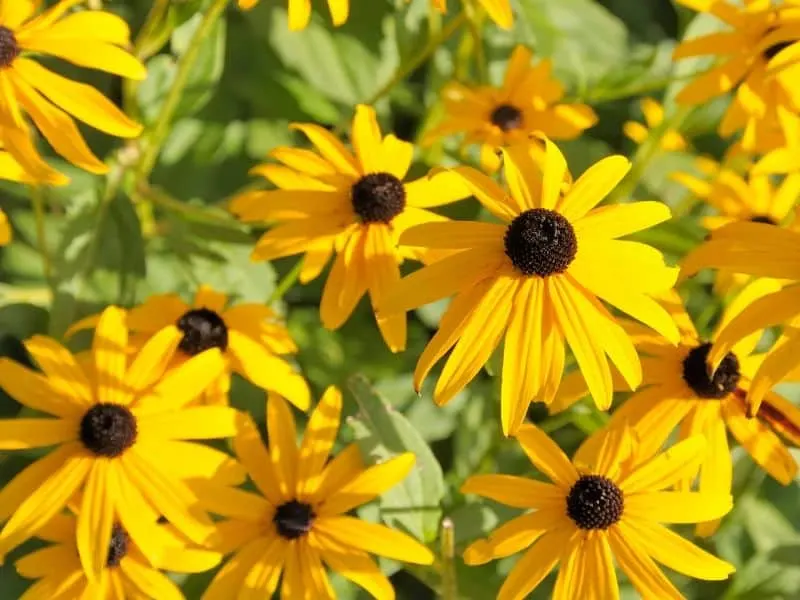
A North American prairie native, the black-eyed Susan has orange, daisy-like flowers with conical black centers. They are perfect for summer arrangements and will also attract pollinators to the garden.
27. Purple coneflower
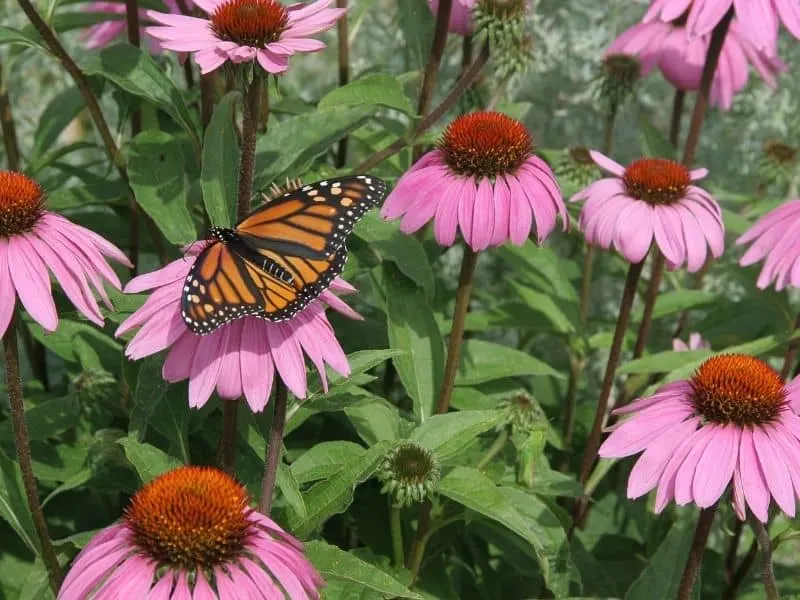
Also known by its genus, Echinacea, purple coneflower is commonly grown for its medicinal uses, pollinator attraction, and general beauty. These native prairie flowers are widely adaptable and low maintenance.
28. Aster
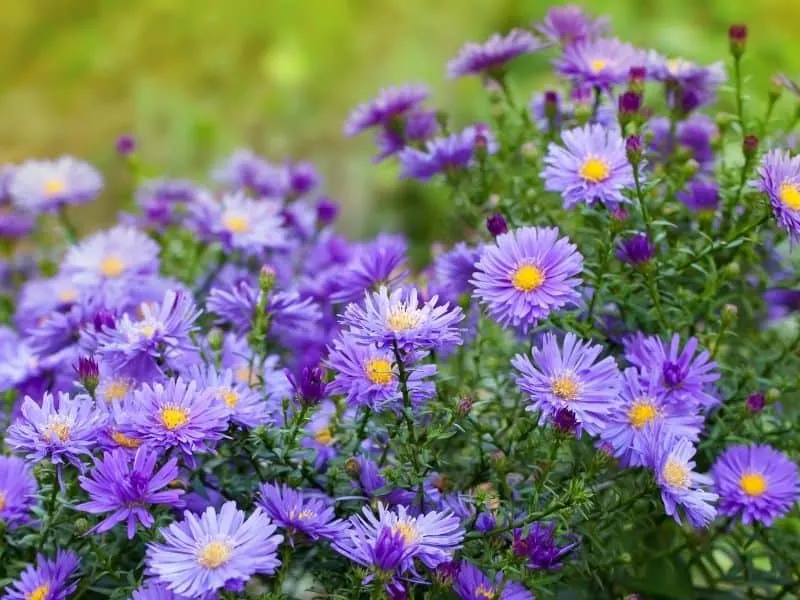
These star-like flowers are native to every continent except Australia and Antarctica. With more than 600 species, they come in nearly every color, though white, blue, and purple are most common.
Cut flower garden layout
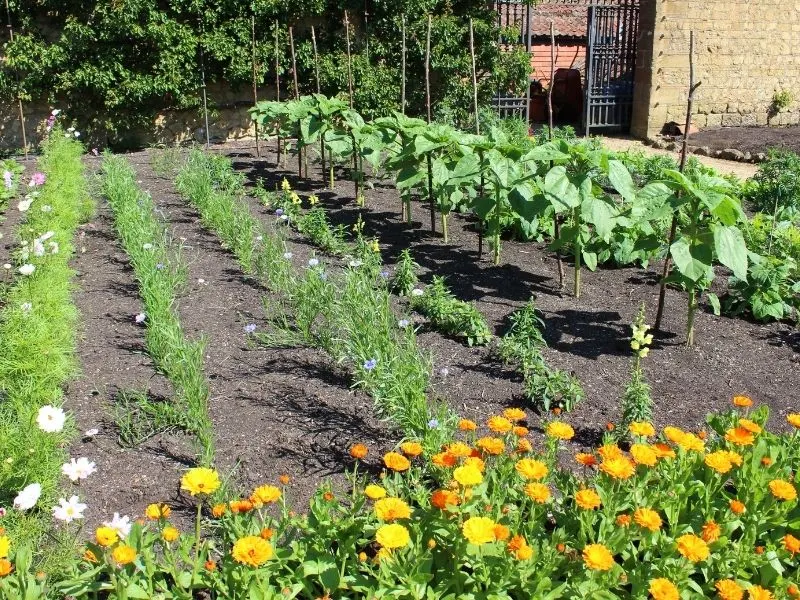
Although flowers for cutting may be incorporated into your general landscape design (this works especially well with a cottage garden), cut flower garden plans typically focus on easy access for maintenance and harvest. Choose a site with full sun, keeping in mind that some flowers will appreciate a bit of shade and may need to be planted elsewhere or simply put next to taller plants.
Planting in rows or narrow beds is perhaps the most practical approach, leaving sufficient space for paths between. Group plants for easy maintenance, separating annuals from perennials and grouping those that need staked or trellised. Further considerations include divisions based on seasonality or bloom time, flower type, color palette, or water and nutrient requirements.
How to plant a cut flower garden
As with a vegetable garden, start by loosening the soil and mixing in some compost, at a minimum. For the best, healthiest flowers, test your soil with a DIY kit or send off a sample to your local extension office, then add amendments as necessary.
Specific planting instructions will vary by flower type, so make sure to read each seed packet carefully. Some plants do better when direct sown, while others can be started indoors to get a head start. Regardless, plan for succession planting to ensure that you have flowers to pick all summer. Although this is especially true for plants like single stem sunflowers, which only produce a single blossom, many cut-and-come-again annuals diminish in quality or quantity of flowers over time.
Adding mulch, like straw or shredded leaves, around the flowers will help suppress weeds, prevent soil compaction, and improve water retention.
Water regularly, ideally in the early morning, and consider using a drip irrigation system to use water more efficiently and avoid getting the leaves wet, which can lead to diseases and other problems.
Finally, if the garden produces more flowers than you can use, remember to remove spent blooms so that new ones continue to grow.
Enjoy a colorful harvest
Ready to get started? Remember to choose just a few varieties to begin with, so you don’t become overwhelmed in your first year.
Tuck flowers in among your existing beds, plant a row in the vegetable garden or build new beds dedicated entirely to your new cut flower enterprise. Whichever option you go with, you will surely enjoy colorful flowers in your home, and in the garden, all summer long.
Fresh cut flower arrangements
A cut flower garden is great to look at, but once you have all those flowers, make sure to use them to brighten someone’s day. Make a few bouquets every week for your house (yes, add one in every room!), and take some to a local nursing home, maybe to the fire department, and to your neighbors.
Or, if you have the time and inclination, take them to the local market and make a few extra bucks.
Here are some fresh-cut flower arrangements for inspiration.
Bridal bouquet
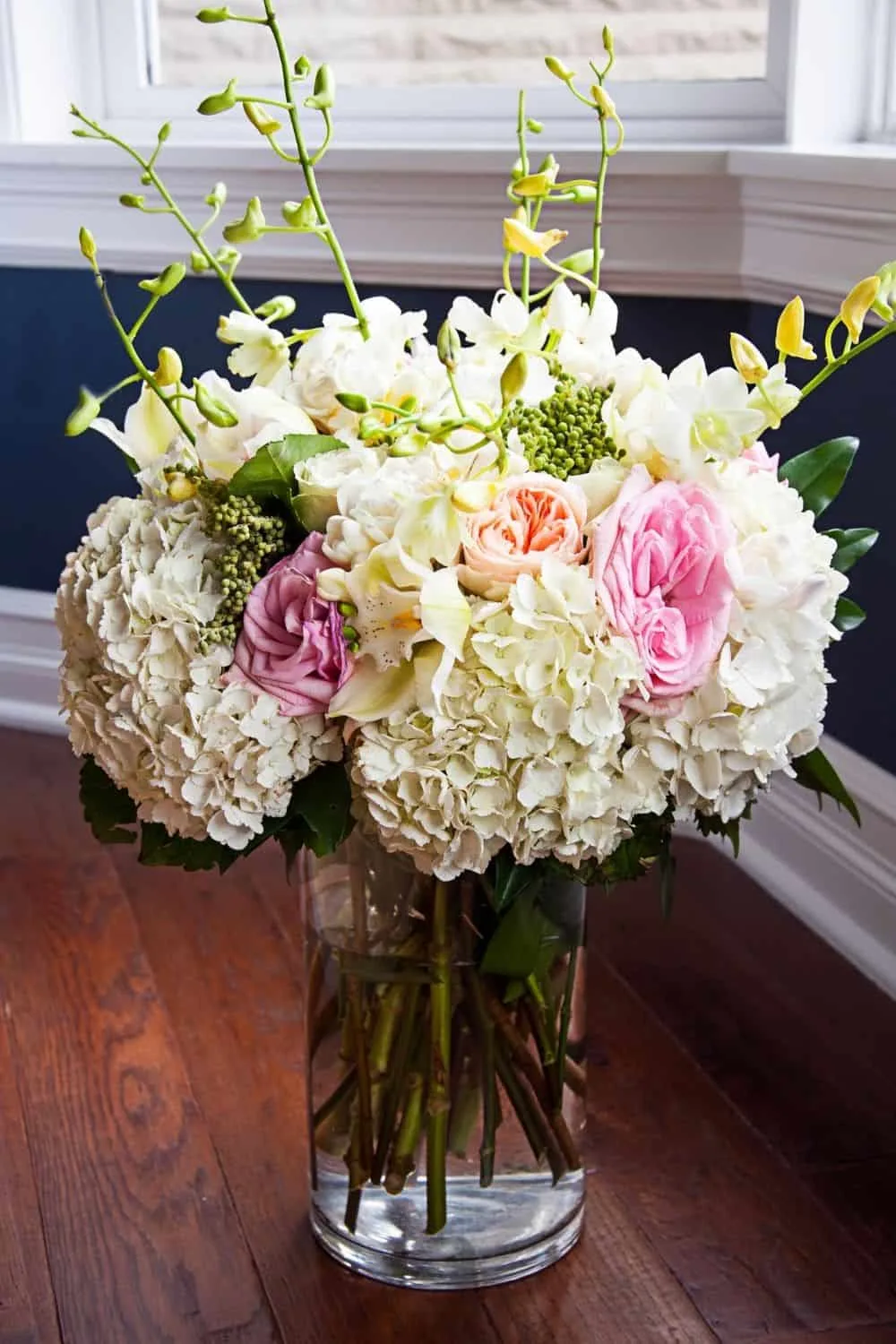
Simple, yet so elegant, this white and pastels bouquet is perfect for a country wedding, as well as a romantic diner table.
Colorful bouquet
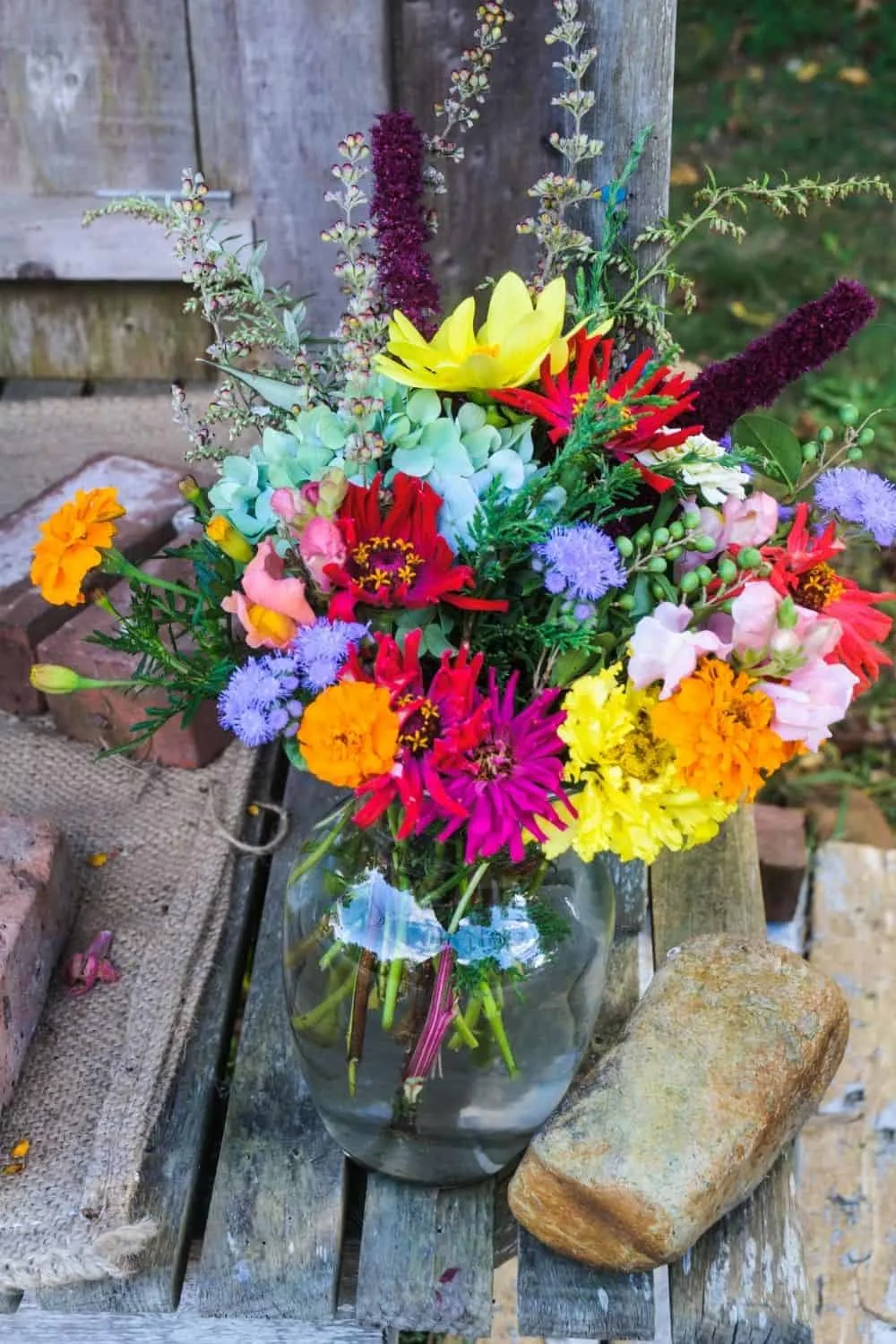
So many colors! Know someone who loves vibrant colors? Gather up flowers in every color and shape and stick them into a glass vase. This would be perfect on an outdoor table on the back porch.
Red tea kettle
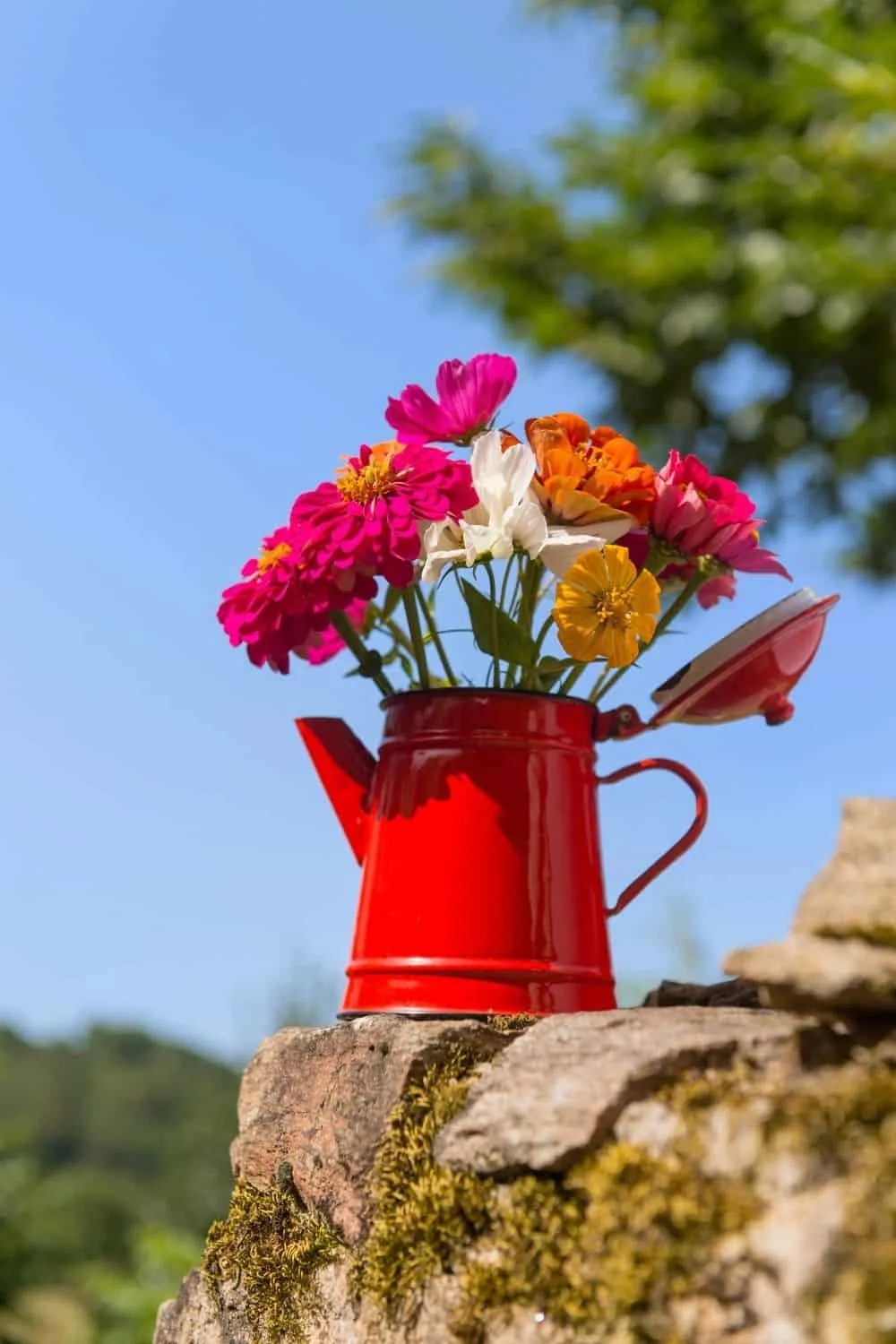
How cute! A variety of zinnia flowers in a red tea kettle: quick and easy, yet so pretty!
Simple beauty
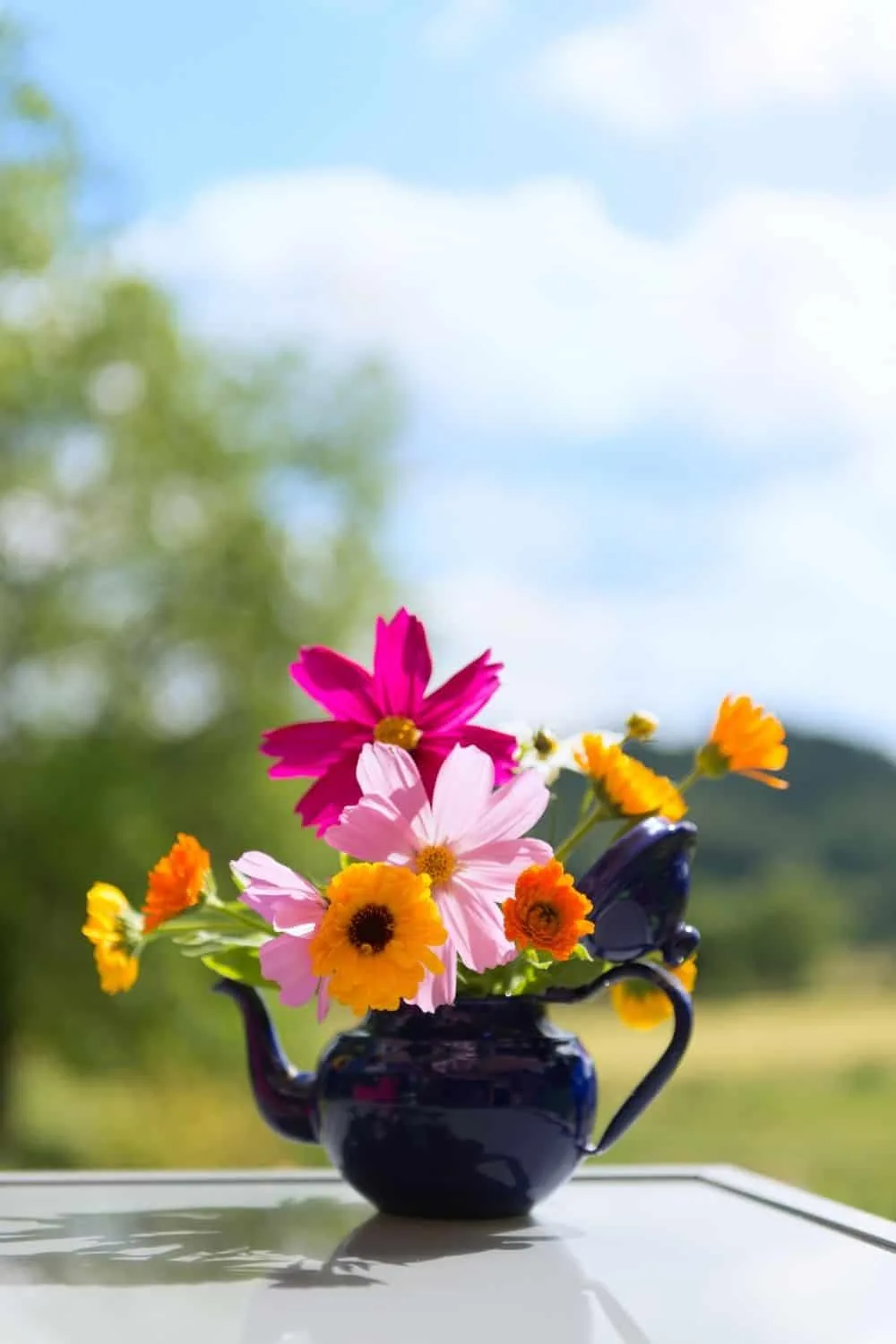
A unique container can make a difference. Here, a few cosmos and calendulas make a beautiful presentation for your outdoor table. Enjoy the colors of the summer on your front or back porch.
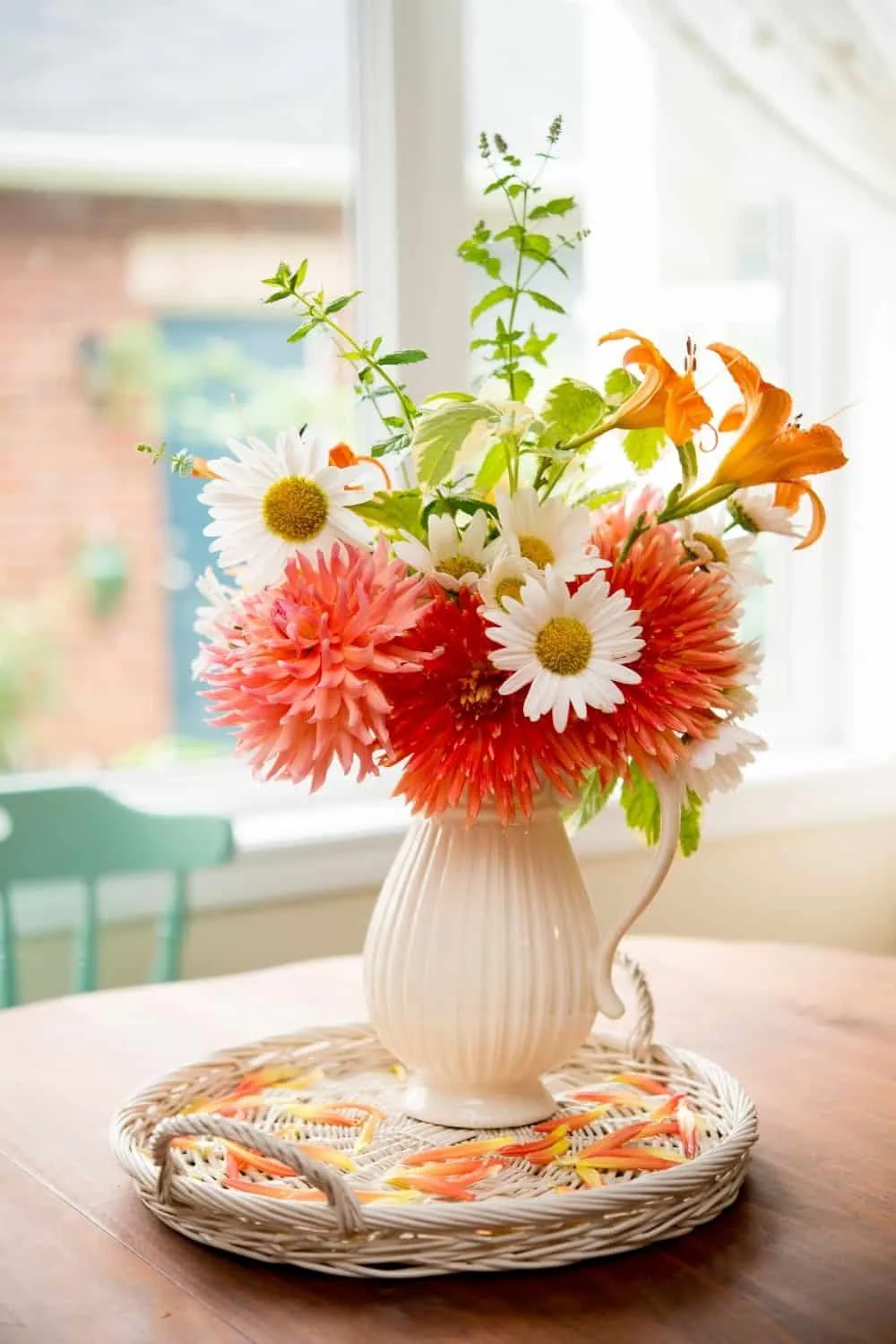
Fresh, light, and airy, this bouquet is the perfect summer addition to your home. Use cute accessories, like this white vase and white wicker tray to enhance the look of your arrangements.
This is just a small sample of the many possible ways to arrange flowers from your cut flower garden. Go wild! Try as many combinations as you can come up with. Don’t let your flowers go to waste. share them with a friend or even a stranger. And, above all, have fun and enjoy the beauty of nature.
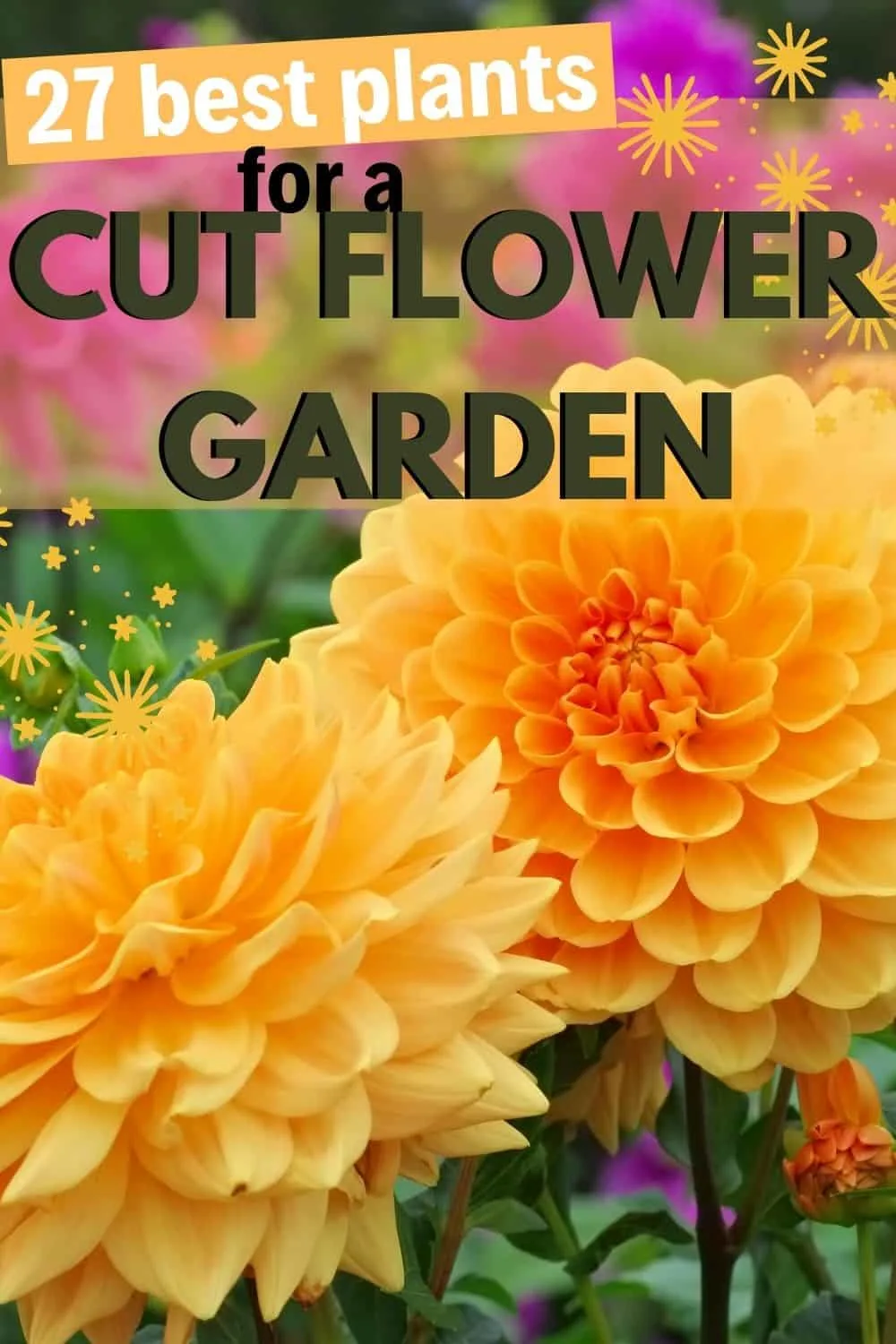
Serena Manickam is a freelance editor and writer and sustainable market gardener in rural Virginia. She holds a BA in environmental science and runs Fairydiddle Farm, a small market garden in which she grows no-spray produce and herbs to sell at a local farmer’s market.


27 Bright And Colorful Flowers With Pictures
Tuesday 4th of July 2023
[…] flowers make better cut flowers, so planning before you plant can be helpful if you know you plan on doing that. Some flowers […]
How To Grow Zinnias From Seed To Gorgeous Flowers (Step-by-Step)
Sunday 23rd of April 2023
[…] They come in a wide range of colors, sizes, petal types, and more, giving these annual flowers tons of visual interest. They make excellent cut flowers and are a perfect addition to any cut flower garden. […]
North Dakota Native Plants List: 12 Amazing Garden Plants
Monday 10th of April 2023
[…] It has low to average water needs and likes well-drained soil. This is also a good choice for cut flowers. It attracts butterflies and hummingbirds and it’s perfect for flower beds or […]
8 Kingly Flowers That Start With K
Monday 10th of April 2023
[…] excellent candidate for both cottage and cut flowers gardens, knautia is a short-lived perennial but readily reseeds. Plant this delightful flower in a location […]
9 Stunning Blue Shade Perennials
Wednesday 29th of March 2023
[…] bloom in late spring to early summer, in zones 2 to 9, and are often used in cut flower […]